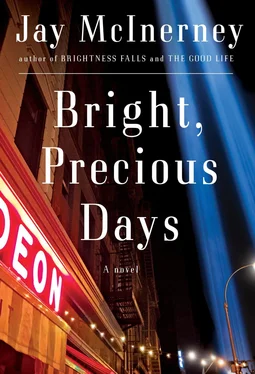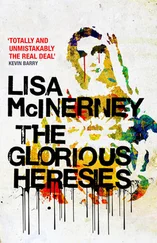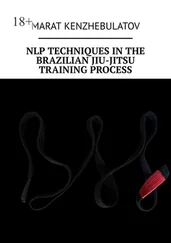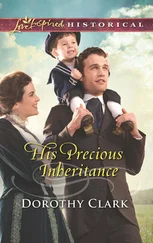The apartment was dark. He pulled off the shredded remains of his socks and deposited them in the kitchen trash bin, then tended to the soles of his numbed feet with damp paper towels.
In the bedroom, he moved stealthily as he undressed.
“How was it?” Corrine asked when he’d settled in beside her.
“Oh, baby, I’m in so much trouble,” he said, rolling over and burrowing into the warm, fragrant refuge between her arm and breast, his heart still pounding with panic.
“CORRINE, WE HAVEN’T SEEN YOU IN AGES.”
“Hello, Sara. Athena.”
“We’ve been thinking of you.”
“That’s good to know.”
“If there’s absolutely anything we can do…”
“I’ll absolutely be sure to let you know.”
No matter how early Corrine arrived to pick up the kids, Sara Birkhardt and Athena Goldstein always seemed to be waiting outside the school, inseparable and inevitable as the gargoyles adorning the Gothic Revival building across the street. In fact, she often chose to delegate picking up the kids to Jean, which seemed to constitute a form of malign neglect to these Battery Park harpies in their pastel Lululemon tops and black leggings. Even worse than their disapproval, she realized this afternoon, was their faux sympathy and sugar-coated schadenfreude. But Jean was taking a sick day and she’d had no choice but to make the pickup — Russell could sometimes buzz down from work, but she hadn’t even bothered to ask him today. God knows he had enough to worry about — a few days earlier he’d been bushwhacked by a TV news crew outside his office.
Some of the sixth-grade parents let their kids find their own way home, but Corrine wasn’t ready for that. She’d arrived in New York just a few months after Etan Patz had disappeared between his parents’ SoHo apartment and the bus stop on his very first unescorted morning expedition, and while the city was far safer now than in 1979, she saw absolutely no reason to tempt fate.
“We all love Russell,” Athena said.
“He’s a terrific father,” Sara said.
“He really is,” Corrine said.
The other mothers were acting studiously ignorant, quietly conferring or staring at their BlackBerries while the Caribbean nannies formed a separate cadre a little farther up the block.
“Please give him our love.”
“I certainly will.”
Taking out her own cell phone and staring at it blindly, she hoped to ignore her ostensible support group. She was dying to tell them that her kids weren’t long for this shitty school, having gotten into Hunter, but if they hadn’t heard already, they’d find out soon enough.
“He must feel terribly betrayed.”
She decided this observation didn’t require an answer.
“I mean, they were friends, weren’t they?”
“Not really,” Corrine said. “Associates, obviously, but it wasn’t as if they were close — more a question of circumstances throwing them together, like when you find yourself socializing with people just because your kids go to school together.”
It was hard to tell whether this was overkill, or too subtle by half; both women were still absorbing and evaluating the insult when the doors swung open and the kids started pouring out, a trickle of older boys at first, pushing and testing out their voices in the open air, then successive waves of liberated children, her own emerging separately, Jeremy first, his friend Nicholas tugging on his arm and shrieking about some unfinished business, then Storey in her little gang of four — Taylor, Hannah and Madison, three new friends so precious that she kept them as far away from her family, or at least her mother, as possible.
“Hey, Mom, it’s you,” Jeremy said, sounding pleasantly surprised. “Can Nick come home with us?”
“Not today, honey. You have karate, remember?”
“Oh, right.”
Storey huddled with her crew up the sidewalk.
“Are you taking me to the dojo?”
She nodded.
“In a taxi?”
“If we see one.”
“Nick says the subway is for poor people.”
She hated that sort of thing — it was precisely the kind of attitude they’d hoped to avoid by keeping their kids downtown, not that they’d had much choice, of course, until the kids had been old enough to take the test for the gifted program at Hunter. But these distinctions were losing their relevance in an era when hedge funders were colonizing SoHo and TriBeCa.
Storey finally tore herself away from her friends and slouched over.
“How was school, honey?”
“Same old, same old.” As they started walking north, she said, “Taylor says Dad’s a criminal.”
Corrine stopped in her tracks, half-tempted to troop back and find the little bitch’s mother, whom she’d seen among the waiting parents. “Tell me exactly what she said.”
“Is it true?”
“Of course it’s not true. What did she say?”
“She said that it was in the news that Dad published a book that was full of lies.”
She squatted on the sidewalk in front of them, allowing a curious mother and son to pass by before saying, “Listen, you guys, your dad made an honest mistake. He trusted someone he shouldn’t have trusted.”
“That guy Phillip,” Jeremy said.
“That’s right. Your dad published his book, having every reason to believe that it was true.”
“Wait a minute,” Jeremy said. “I thought Dad published fiction.”
“Dad usually does. That’s probably what he’s best at. But this was supposed to be a memoir, a true story — except now it looks like it wasn’t. Your dad got fooled, along with a lot of other people. But he didn’t do anything criminal. Stupid, possibly, but not criminal.”
“Whoa, Mom,” Storey said. “I can’t believe you just said that.”
“I’m trying to be honest with you guys.”
“But Dad’s incredibly smart.” This was a point of faith with the kids, a tenet of the family creed. Dad the brilliant, Dad the Oxford scholar.
“Smart people sometimes do dumb things. And the guy who wrote the book is pretty smart, too. But besides being smart, your dad is generous and honest and he believes other people are honest, too. Which, of course, isn’t always true.”
“I knew that guy was a jerk,” Jeremy said.
“You thought that?”
“Yeah. He just seemed kind of phony. He had this way of trying to talk to kids, trying to seem cool. It was just totally fake.”
Corrine was impressed. “Actually, I thought so, too,” she said. “Your dad can be a little too trusting.”
“Are you mad at him?” Storey asked.
She sighed, wondering how nuanced you can be with your own children. “No, I feel bad for him.” Of course she’d been supportive and sympathetic in the three days since the scandal had broken, but her sympathy had indeed sometimes given way to anger. She’d always had a bad feeling about the book, not only the dizzying and unprecedented advance he’d laid out, but also about the project itself, both author and publisher having abandoned their proven métier for reasons of fashion and commerce. And now they were all four going to suffer for the mistake. And she was upset with Russell for defending Kohout that crucial first day after the news broke, giving that halfhearted statement of support to the Times instead of instantly acknowledging his mistake. She could hardly bear to look at her husband the next night as they watched Kohout, who appeared to be sedated, try to defend himself on the Charlie Rose show. But she felt guilty, too, that she’d never told Russell about the time Phillip had hit on her not long after his first novel had come out. Maybe that would have helped tip the scales against him.
Читать дальше












